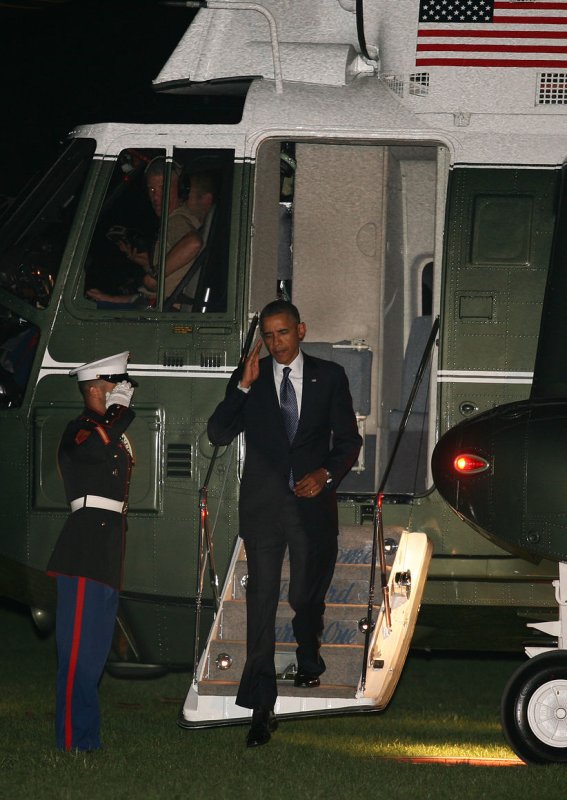President Barack Obama returns to the South Lawn of the White House following his trip to the G20 Summit in St. Petersburg, Russia, in Washington, on September 6, 2013. UPI/Martin H. Simon/Pool |
License Photo
DUSSELDORF, Germany, Sept. 9 (UPI) -- The Group of 20 summit in St. Petersburg, Russia, should have secured three achievements, which had been thoroughly discussed by officials in advance and which had nothing to do with Syria.
The first was to agree an international consensus and, if possible, a formal agreement on sharing tax information so international corporations would find it less easy to play the system. This was partially achieved, at least in principle, but the devil will be in the details, as always.
The second was to agree on broad principles to police and supervise the shadow banking system of hedge funds, private equity, derivatives, money market funds and new credit systems (like PayPal, Facebook credits and Google wallet). They are playing an increasingly important role in the global economy (not least in China) but aren't regulated like banks. In the event, this issue was ducked. The G20 agreed to look at the matter again in November. Prospects for success are slim.
The third issue was probably the most serious; the degree to which the policies of the Federal Reserve, the United States' central bank, have whipsawed emergent economies, first flooding them with easy money and then closing the tap. Indian Prime Minister Manmohan Singh raised the issue at the summit table in St Petersburg to little effect.
In truth, there was little that U.S. President Barrack Obama could do about this. The Fed is an independent body and its statutes require it to run U.S. monetary policy with the double objectives of low inflation and low unemployment. The effect of the Fed's policies on the rest of the world is irrelevant.
But the U.S. dollar being the world's reserve currency, the Fed's decision to raise or lower interest rates has a global impact. In responding to the great recession with years of low interest rates, which means zero or (after inflation) negative interest on U.S. Treasury bonds, means that savers have been hunting for better yields. Money accordingly flooded in to the emergent markets.
However, when the Fed signaled earlier this year that this period was coming toward its close, interest rates began to rise. India, Japan, Turkey and other emergent economies that had been feasting on the flood of money hunting higher yields suddenly saw the money disappear, their currencies falter and the dollar debt that had looked so cheap began to look frighteningly expensive.
Was it not possible, Singh suggested, for the G20 to set up some system by which central bankers could consult on the effects of key policy changes?
In fact, this already exists on an informal level. The Group of Seven central bankers do consult with one another and there are even less formal, in fact essentially personal links between some of them and the central bankers of China, Brazil and India, particularly since Raghuram Rajan, the new head of the Reserve Bank of India, is well-known and respected in the West.
But what could consultation achieve? Central bankers have the national economy as their first priority and will usually take decisions accordingly. In times of dire global crisis, like the crash of September 2008, which forced the G20 to become a serious institution of global governance, governments and central bankers alike can think and act globally.
Usually, however, national politics come first.
Moreover, these days central bankers signal their intentions. We all knew that the Fed was intent on keeping interest rates low until the United States showed clear signs of recovery.
Equally, we all knew that once the new Japanese government came into power it was going to take risks to revive the stalled Japanese economy.
And we knew that the European Central Bank would do whatever it took to save the euro.
Central bankers elsewhere knew what this meant. They could have persuaded their governments to reintroduce capital controls to protect themselves against the whiplash effect of hot money flooding in and out.
In fact, thinking they had learned the lessons of the last such episode in 1998, they assumed that their fatter foreign exchange reserves and more vibrant economies would allow them to navigate the storm. It isn't yet clear that they were wrong.
The sadness here isn't that the G20 failed. It was never meant to be a forum for political issues like Syria, which sadly dominated the proceedings. It was intended to be a forum for sober reflection on the global economy and ways to make it function better in everyone's interests.
In times of universal crisis, the G20 can achieve wonders; it demonstrated that in 2009. When the crisis is partial, or when the institution is overwhelmed by an issue as divisive as Syria, its limits become clear.
The real problem is our swollen expectations; the rest is so much political noise.















